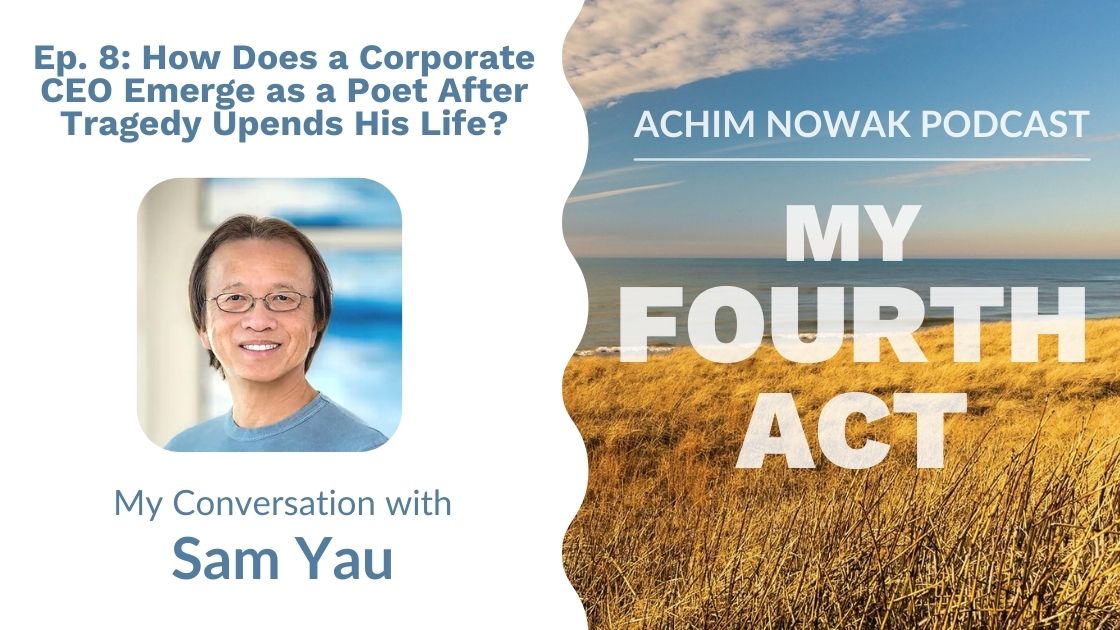It’s the sort of phone call you’re never ready for. For Chinese-born Sam Yau, a supremely successful CEO of billion-dollar corporations and Head of the Board of Directors at the world-renowned Esalen Institute, the news came in the form of a call from his daughter who had found his son Ryan’s dead body.
Ryan had shot himself in the head. He was 27.
The instant that call was over, the next act in Sam’s life began. Facing life after losing his son. In Sam’s exquisite book of poetry, the international Amazon bestseller “Soul’s Journey,” Sam offers us a glimpse of his inner journey in the moments and days immediately after he learned of Ryan’s suicide.

My heart was shattered
in a million pieces.
Fear gripped me,
my pulse pounded,
my body shook.
I feel closer to you every day.
I see you everywhere –
a baby in a carrier,
a boy running to his dad,
a young man in a café,
birds, clouds.
It is my turn to be
endlessly triggered. (From “Transfigured” by Sam Yau)
Let me be clear. Before Ryan’s death, Sam Yau had never written a word of poetry. He now considers writing poetry his life’s calling and personal mission.
I read the words in Sam’s poem and think of my brother Thomas’ suicide. I remember the call I received as if it was yesterday. Remember some of the sensations Sam so aptly names. The things we all feel and face when we encounter death and loss.
In her iconic 1969 book, “On Death and Dying,” Elizabeth Kuebler-Ross first described the 5 stages of grieving that most of us experience after a death. David Kessler, a co-author with Kuebler-Ross on their book “Grief and Grieving,” identified a sixth stage of grieving in his aptly named book “Finding Meaning.”
As I speak with Sam Yau about how he faced life after losing his son, it is so very evident that his entire journey was a journey into discovering new meaning for his own life. While your journey may not tilt you toward writing poetry, I hope that some of the distinct experiences Sam describes to me in our MY FOURTH ACT Podcast chat will serve as a helpful guide to you, as well.
1. Connect with the Divine
Find or strengthen your connection with the divine. This can be a beautiful part of our personal healing. “The soul is more than the physical body,” Sam Yau affirms. While Sam had already believed this after years of metaphysical studies, facing life after the loss of his son invited him to know this truth more deeply, every single day.
“Deep down I knew that Ryan’s soul cannot die,” Sam explains. “So I developed the habit of looking into the sky and the cloud patterns for messages from Ryan. I fell in love with the forever shape-shifting clouds. The light of the sky actually represents the divine. We call people who are spiritual and help the world light workers. Every time I looked to the light of the sky I was looking at the divine. The power of my healing came as I came to know with certainty that Ryan is much more alive now than he ever was in his living life on Earth.”
2. Pay attention to guidance you receive
Sam Yau lost interest in most things right after his son’s death. He was fully in his classic early-grief-stages. As you lose interest in many things that mattered greatly before a loss, have the courage to ask the question. What next? Ask, don’t force an answer, and be open to receiving guidance, no matter what form it may come in.
“The voices won’t just come in your thoughts,” Sam affirms. “The soul’s whispering includes your body sensations and feeling your whole body. Our body is amazing as an instrument for the divine. It informs us of what may be right for us, what may be wrong, whether something is a potential goal or not. Hearing these whispers is a wonderful way of receiving messages.”
3. Notice the helpers
Sam received messages from various sources that the way he was going to heal, not just himself but also other people, was through words. “This was a total surprise to me,” Sam explains. So he said to himself “Ok, I don’t understand what this is about. Let me see what unfolds.”
Sure enough, within three months people came into Sam’s life, seemingly out of nowhere. People who inspired Sam to write poetry. Sam got a teacher who proved to be the best coach he had ever had. Someone volunteered to read his poems, one poem at a time. Another person offered to create original art that would illustrate the poems. Suddenly there was a group of friends who was steadily offering feedback and cheering Sam on. “I was just going along with what I was told,” Sam reflects, “and then the evidence was so strong that writing poetry is something I was going to do. It was so clear.”
When our hearts stay open, the helpers appear. I think of Sam’s helpers as the angels that urged him to move into deeper healing. Even when you’re not facing life after losing your son, the angels will always appear. They are here. It behooves us to notice and accept their guidance.
4. Dare to take action
When I ask Sam about his thoughts for his own future, his answer is clear: “For myself, I’m devoted to writing poetry. Because that’s my joy. And that’s my calling. And I will continue to do that. In fact, I try to simplify my life so that I can focus on doing that.”
This is where facing life after losing his son Ryan has taken Sam. In the final stretches of his healing journey, getting to this degree of clarity required taking some concrete action. It would have been just fine for Sam to write poetry purely for his own healing. But Sam understood that writing poetry was his new calling, or to use David Kessler’s terminology, his sixth stage of healing. So Sam got his book published, hired a publicist, and decided to step out of his seclusion to become an active ambassador for his healing messages. He understood that these actions were integral to claiming the new meaning of his life, and Sam chose to fully step into this meaning
If you are facing life after losing your son, your journey may look nothing like Sam’s. But please remember this: Your soul, as well, yearns to step into new meaning. You, as well, may have a whole new act waiting for you.
I invite you to read exquisite Sam Yau’s book, “Soul’s Journey,” for inspiration and sustenance, and listen to the illuminating MY FOURTH ACT Podcast conversation I had with Sam.
I leave you with the following words from Sam’s poem “A Prayer.”
I am a soul.
I was never born.
I will never die.
Love will never end.
May I live with the awareness
of these veiled truths
while shrouded in human form.
Achim Nowak is the Author of 3 books on Personal Presence, a CEO Advisor, Mastermind Convener and Host of the MY FOURTH ACT Podcast.



0 Comments